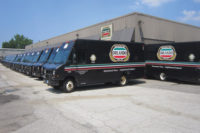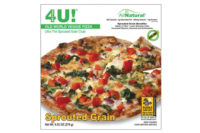
By Dan Malovany
Floyd Snell lived in the fast lane. Prior to joining Charter Baking Co., the veteran baker worked for some of the industry’s largest companies, producing some of the nation’s top-selling premium variety breads. When it came to baking at his previous employers, conventional thinking focused on how to crank up production without noticeably compromising quality of the end product, at least in the consumer’s mind.
“Everything you do in the conventional world is done to accelerate the process,” Snell says, vice president of operations for Charter Baking.
That mindset began to change after he began working at the company’s Boulder, Colo., bakery, which produces Rudi’s Organic baked goods. There, everything he knew about the conventional baking seemed to get turned on his head. He quickly found out that the laws that governed the bread-making process seemingly didn’t apply in the art-of-baking world.
Were they certified crazy? No, just certified organic.
Take batch sizes for instance. For conventional breads, it’s not unusual to mix batches of dough to range anywhere from 1,500 lb. to even 3,000 lb. For Rudi’s Organic bread, batches never exceed 700 lb. and 450 lb. for buns and rolls.
“It’s an old-home, Old World methodology of making things in small batches and controlling what you do and ensuring the end-product is consistent,” Snell explains.
Or check out the sponge-and-dough process for a conventional product versus that for Rudi’s Organic sandwich and artisan breads. In the conventional world, sponges typically ferment in a temperature-controlled room at around 80°F for three to four hours. A batch of dough usually contains 70% to 80% sponge. To produce Rudi’s bread, sponges ferment for up to 12 hours in a 58°F room. A batch of dough contains no more than 15% sponge.
How can that be?
“It contributes a lot to the flavor and texture of the products,” Snell notes. “I would have never guessed you can have a sponge ferment for 10 to 12 hours without having to deal with an old dough situation or having to adjust your mix time to try to compensate for it.”
If the production goes down for 90 minutes in a conventional sponge-and-dough bread bakery, bakers have to scramble to tweak formulas as well as mixing times and temperatures to maintain the quality of the products.
“Here, if you lose an hour of time, there are no adjustments that have to be made,” Snell says. “Your bandwidth of tolerance is very wide.”
Flexible Philosophy
The 63,000 sq. ft. is certified organic by Quality Assurance International, has four different Kosher certifications and a superior rating from the American Institute of Baking.
That’s not always easy when producing organic products. Long fermentation and proofing times, Snell says, don’t lend themselves to automation.
Fortunately, the bakery freezes products and bakes to inventory, which provides both operational versatility and production efficiencies. Baking to inventory allows the bakery to schedule long runs and minimize changeovers.
Production runs on two, 10-hour shifts four days a week. The longer runs help bakers produce more consistent products because they aren’t stopping and starting up while the longer shift times provide employees with a three-day weekend, more family time and saves fuel costs driving to and from work, Snell says.
Organic white and whole-wheat flour are stored in 70,000 lb. silos enclosed inside the plant. All other dry and liquid ingredients come in 50-lb. bags and totes. Minor and micro ingredients, including compressed yeast, are pre-scaled by hand per batch while bulk flour is automatically metered into the spiral mixers. Sponges, stored in 150-lb. containers, are added to the dough. In addition to providing flavor and texture, the sponge along with a little vinegar also provides added shelf life. Loaves of bread have seven-day retail code and are best up to 10 days. Buns have a five-day code that’s best up to seven days.
The bread line has two makeup lines for panned bread and artisan breads. A senior crew of bakers makes up artisan breads every Thursday.
“Because they are unique in their design, we have a schedule where we have them produced by the same people on the same shift every week,” Snell says.
After mixing, the bowls receive final floor time of 20 minutes to 1.5 hours, depending on the variety. Panned breads are produced on a makeup line installed by Charter Baking since it acquired Rudi’s three years ago. After passing through a four-pocket piston divider, the pieces travel through a traditional cone rounder before receiving 15 minutes of rest time.
After sheeting, moulding and depositing into four-strap pans, the pieces are rolled into an 80-rack proofer for 2.5 hours.
The bakery has eight rack ovens, five for bread and three for buns and rolls, and there is space to add three more rack ovens, as needed. Bake times for bread typically range around 26 to 27 minutes. Although Charter Baking has tunnel ovens in some of its other bakeries, Snell says, the Boulder operation prefers the flexibility that rack ovens provide. Currently, the bread line produces about 2,600 loaves an hour.
Unconventional Packaging
After cooling for 1.5 hours, which lowers the loaves’ temperature to about 100°F, the items are sliced and bagged and pass through metal detection before they’re placed in baskets. The bakery has two packaging lines for bread and one for buns and rolls.
Now here’s where the bakery goes unconventional again. Because it freezes products, which are thawed and placed on bread shelves by store employees, the bakery needs to take the packaged loaves out of the baskets and place them eight to a case, on average. To minimize labor, the bakery uses a robot with a basket unstacker to automatically unload the loaves and place them on a conveyor. An automatic case erector builds the cases, which are manually loaded with bread before being automatically sealed, then manually palletized and shrinkwrapped.
Figuring out how to robotically unload the baskets took a little reverse engineering since normally robotics are used to load - and not unload - baskets in the baking industry.
“That posed some unique challenges in trying to get the right robotic arm that would function properly,” Snell says. “We still have people putting the loaves in the case manually, but emptying the baskets has been automated, which has really improved the efficiencies back there.”
The pallets are stored in the plant’s 20,000-sq.-ft. freezer, which holds 500 pallets or about 12 days of products. The bakery also uses offsite cold storage for products.
For quality control, Snell and his supervisory staff hold daily scorings the day after each production run. In addition to checking for flavor, color, texture, cell structure and other attributes for the 95% organic products, the quality assurance department checks moisture, pH and total titratable acidity (TTA). The products are scored throughout their shelf life to monitor quality because the organic products contain no mold inhibitors, shelf extenders, softeners or other preservatives.
“On the organic and natural side, you have to control your processes more tightly than in the conventional bakers’ world,” Snell notes. “You don’t have the ability to use many ingredients that are available in the conventional world.”
Because chemical cleaners are not allowed in certified-organic operations, the bakery for the most part uses vinegar for cleaning. Daily swabbing is used to confirm sanitation procedures.
To further control the process and prevent premature molding, the bakery filters air, even house air, down to the one micron level. A lot traceability system provides additional food safety features.
Although Snell and his staff of supervisors search for new ways to improve productivity through automation, there are some things they will never do.
“No matter whatever changes we maintain from an efficiency standpoint or capital investment perspective, the fermentation or the final proofing process will never be addressed as an opportunity for improvement,” Snell says.
Life in the fast lane apparently is overrated.


